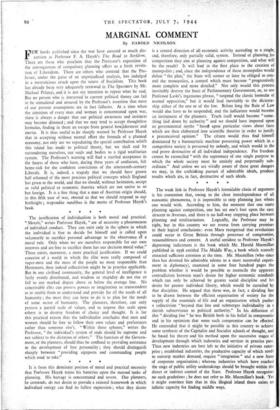The weak link in Professor Hayek's formidable chain of argument
is his contention that, owing to the close interdependence of all economic phenomena, it is impossible to stop planning just where one would wish. According to him, the moment that one starts planning against competition, one has set one's foot upon the easy descent to Avernus, and there is no half-way stopping place between
planning and totalitarianism. Logically, the Professor may be right, but in this country we are averse from carrying premises to their logical conclusions: even Marx recognised that revolutions could occur in Great Britain through processes of compromise, reasonableness and consent. A useful antidote to Professor Hayek's depressing indictment is the book which Mr. Harold Macmillan published in 1938 entitled The Middle Way, a book which scarcely attracted sufficient attention at the time. Mr. Macmillan (who since then has devoted his admirable talents to a most successful experi- ment in diplomacy), examined in some four hundred pages the problem whether it would be possible to reconcile the apparent contradiction between man's desire for higher economic standards which can only be achieved by greater social discipline and his desire for greater individual liberty, which would be curtailed by that discipline. He argued that there was, in fact, a dividing line to be drawn between the efficient organisation of society for the supply of the essentials of 'life and an organisation which pushes a collectivism " beyond that line and submerges individuality in a slavish subservience to political authority." In his definition of this " dividing line " he was British both in his belief in compromise and in his optimism that some such compromise can be effected. He contended that it might be possible in this country to achieve some synthesis of the Capitalist and Socialist schools of thought, and he based his theory and his method upon the successive stages of development through which industries and services in practice pass. Thus new industries are best left to the initiative of private enter- prise ; established industries, the productive capacity of which tends to outstrip market demand, require " integration " and a new form of corporate organisation ; whereas industries which have reached the stage of public utility undertakings should- be brought within the direct or indirect control of the State. Professor Hayek recognises no such gradations ; he does not refer to Mr. Macmillan's book. Yet it might convince him that in this illogical island there exists an infinite capacity for finding middle ways.


























 Previous page
Previous page